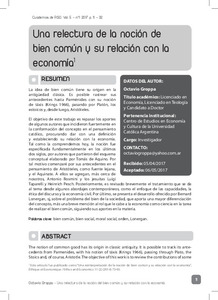Por favor, use este identificador para citar o enlazar este ítem:
https://repositorio.uca.edu.ar/handle/123456789/15061| Título: | Una relectura de la noción de bien común y su relación con la economía | Autor: | Groppa, Octavio | Palabras clave: | BIEN COMUN; ECONOMIA; FILOSOFIA DE LA ECONOMIA; ETICA; PENSAMIENTO SOCIAL; CRISTIANISMO | Fecha de publicación: | 2017 | Editorial: | Universidad Católica del Uruguay. Facultad de Ciencias Empresariales. Departamento de Ciencias de la Administración | Cita: | Groppa, O. Una relectura de la noción de bien común y su relación con la economía [en línea]. Cuadernos de RSO. 2017, 5 (1). Disponible en: https://repositorio.uca.edu.ar/handle/123456789/15061 | Resumen: | Resumen: La idea de bien común tiene su origen en la
antigüedad clásica. Es posible rastrear sus
antecedentes hasta Parménides con su noción
de táxis (Krings 1966), pasando por Platón, los
estoicos y, desde luego, Aristóteles.
El objetivo de este trabajo es repasar los aportes
de algunos autores que incidieron fuertemente en
la conformación del concepto en el pensamiento
católico, procurando dar con una definición
y estableciendo su relación con la economía.
Tal como la comprendemos hoy, la noción fue
especificada fundamentalmente en los últimos
dos siglos, por autores que partieron del esquema
conceptual elaborado por Tomás de Aquino. Por
tal motivo comenzaré por sus antecedentes en el
pensamiento de Aristóteles, como fuente lejana,
y el Aquinate. A ellos se agregan, más cerca de
nosotros, Antonio Rosmini y los jesuitas Luigi
Taparelli y Heinrich Pesch. Posteriormente, es revisado brevemente el tratamiento que se da
al tema desde algunos abordajes contemporáneos, como el enfoque de las capacidades, la
ética del discurso y la economía civil. Por último, se presenta el desarrollo ofrecido por Bernard
Lonergan, sj, sobre el problema del bien de la sociedad, que aporta una mayor diferenciación
del concepto, más una breve mención al rol que le cabe a la economía como ciencia en la tarea
de realizar el bien común, siguiendo sus aportes en la materia. Abstract: The notion of common good has its origin in classic antiquity. It is possible to track its antecedents from Parmenides, with his notion of táxis (Krings 1966), passing through Plato, the Stoics and, of course, Aristotle. The objective of this work is to review the contributions of some authors who strongly influenced the conformation of that concept in Catholic thought, aiming to a definition and stating its relationship with economics. As we understand it today, the notion was fundamentally specified in the last two centuries, by authors who departed from the conceptual scheme elaborated by Thomas Aquinas. For this reason I shall begin with its antecedents in the thought of Aristotle, as a distant source, and Aquinas. To them are added, closer to us, Antonio Rosmini and the Jesuits Luigi Taparelli and Heinrich Pesch. Subsequently, it is briefly reviewed the treatment given to the subject by some contemporary schools of thought, such as the capabilities approach, the ethics of discourse and civil economy. Finally, the development offered by Bernard Lonergan on the problem of the good of society (which brings a greater differentiation of the notion) is presented, plus a brief mention of the role that economics has as a science in the task of realizing the common good, following his contributions in the matter. |
URI: | https://repositorio.uca.edu.ar/handle/123456789/15061 | ISSN: | 2301 -105X | Disciplina: | ECONOMIA | Derechos: | Acceso abierto | Fuente: | Cuadernos de RSO. 2017, 5 (1) |
| Aparece en las colecciones: | Artículos |
Ficheros en este ítem:
| Fichero | Descripción | Tamaño | Formato | |
|---|---|---|---|---|
| relectura-nocion-bien-comun.pdf | 194,02 kB | Adobe PDF |  Visualizar/Abrir |
Visualizaciones de página(s)
115
comprobado en 27-abr-2024
Descarga(s)
208
comprobado en 27-abr-2024
Google ScholarTM
Ver en Google Scholar
Este ítem está sujeto a una Licencia Creative Commons

